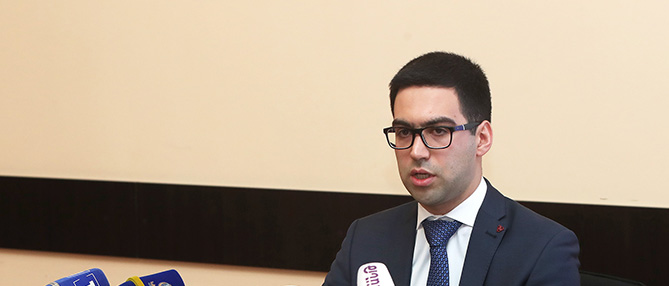Package of judicial reforms put on Armenian National Assembly's floor
04.03.2020,
18:44
Armenia's justice ministry submitted a package of judicial reforms to the National Assembly for approval. The bill proposes to amend the judicial code and 12 related laws. The amendments will give all judges of first-instance courts in Yerevan a right to authorize investigations and searches on criminal cases.

YEREVAN, March 4. /ARKA/. Armenia's justice ministry submitted a package of judicial reforms to the National Assembly for approval. The bill proposes to amend the judicial code and 12 related laws. The amendments will give all judges of first-instance courts in Yerevan a right to authorize investigations and searches on criminal cases.
"In accordance with the present rules, the Supreme Judicial Council composes the list of judges who can consider such cases," Justice Minister Rustam Badasyan said Wednesday while presenting the bill to lawmakers.
In his words, the amendments apply also to the process of formation of the disciplinary committee of the General Assembly of Judges. Under this project, the committee will consist of eight members - two judges from specialized courts, three from first-instance criminal and administrative courts, one from the court of appeal, one from the cassation court and two respected justice specialists.
The minister said that another committee will be set up to assess judges' activities. It will consist of five members - one judge from first-instance court, appeal court and cassation court each and tow respected justice specialists.
"The commission will study the distribution of cases among judges, the acceptable time limits for their consideration and the behavior of judges during court hearings. If the committee finds violations, it has the right to appeal to the disciplinary committee with a request to begin disciplinary proceedings," Badasyan said.
In addition, when considering a candidate for a judge, the recommendation of the Committee for the Prevention of Corruption regarding the credibility of the candidate will be taken into account.
In particular, the Commission on the Prevention of Corruption will collect information about the judge’s past, his real attitude to human rights and other important issues. The property of the candidate and his immediate family will also be evaluated for their legality.
In addition, reforms affect the Supreme Judicial Council. The term in office of the Chairman of the Council is currently 5 years, while the proposed changes are planned to reduce it to 2.5 years. -0-
"In accordance with the present rules, the Supreme Judicial Council composes the list of judges who can consider such cases," Justice Minister Rustam Badasyan said Wednesday while presenting the bill to lawmakers.
In his words, the amendments apply also to the process of formation of the disciplinary committee of the General Assembly of Judges. Under this project, the committee will consist of eight members - two judges from specialized courts, three from first-instance criminal and administrative courts, one from the court of appeal, one from the cassation court and two respected justice specialists.
The minister said that another committee will be set up to assess judges' activities. It will consist of five members - one judge from first-instance court, appeal court and cassation court each and tow respected justice specialists.
"The commission will study the distribution of cases among judges, the acceptable time limits for their consideration and the behavior of judges during court hearings. If the committee finds violations, it has the right to appeal to the disciplinary committee with a request to begin disciplinary proceedings," Badasyan said.
In addition, when considering a candidate for a judge, the recommendation of the Committee for the Prevention of Corruption regarding the credibility of the candidate will be taken into account.
In particular, the Commission on the Prevention of Corruption will collect information about the judge’s past, his real attitude to human rights and other important issues. The property of the candidate and his immediate family will also be evaluated for their legality.
In addition, reforms affect the Supreme Judicial Council. The term in office of the Chairman of the Council is currently 5 years, while the proposed changes are planned to reduce it to 2.5 years. -0-



